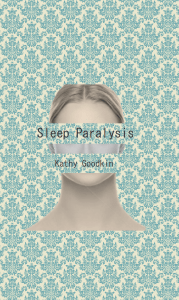Book Review
 Sleep paralysis occurs in the liminal stage while waking or falling asleep, often causing one to hear, feel, or see things that are not actually present. The sufferer may be fully aware of what’s transpiring even while being unable to speak or move. A disorienting episode, to be sure. The base note of Kathy Goodkin’s gorgeous chapbook Sleep Paralysis is disorientation, one that is familiar to those engulfed by the uncertainties of the Anthropocene, a term adopted by atmospheric chemist Paul Crutzen to refer to our current age, a geological era that has been shaped by humans. Our influence on the ecosystem is now so far-reaching that we have become a global force of nature, destabilizing the climate, precipitating a mass extinction crisis, and transforming the land. In response, Goodkin’s chapbook inquires into the ambivalent agency of the individual in the grip of a deep cultural malaise.
Sleep paralysis occurs in the liminal stage while waking or falling asleep, often causing one to hear, feel, or see things that are not actually present. The sufferer may be fully aware of what’s transpiring even while being unable to speak or move. A disorienting episode, to be sure. The base note of Kathy Goodkin’s gorgeous chapbook Sleep Paralysis is disorientation, one that is familiar to those engulfed by the uncertainties of the Anthropocene, a term adopted by atmospheric chemist Paul Crutzen to refer to our current age, a geological era that has been shaped by humans. Our influence on the ecosystem is now so far-reaching that we have become a global force of nature, destabilizing the climate, precipitating a mass extinction crisis, and transforming the land. In response, Goodkin’s chapbook inquires into the ambivalent agency of the individual in the grip of a deep cultural malaise.
The chapbook begins with displacement: the speaker has lost a place once meaningful to her that is now being reshaped and reconstructed; it is a place “newly citied.” Construction might herald the inauguration of a shared living space, of community—even the opening of a politics. Instead, it announces the birth of a city both nondescript and enervated, a site symptomatic of our age. The poem, which is untitled, sectioned into parts, and splintered into fragmented lines, enacts the crisis of neoliberalism: the loss of place-based knowledge and the whitewashing of local ecology and culture:
Clouds low over a new city
Not new to me newly citied
glassed and upright crane’s arm a fixture
Watch the skyline layer up like a body
in real time
cells dividing and dying
As small acts of disruption, the line breaks are exemplary of Goodkin’s formal innovations. Versatile, the collection shifts between experimental lyrics and prose poems; it inhabits the surreal landscapes of dreams, follows the divagations and fugue states of its rattled and dazed speaker, employs ellipses, situates itself in the liminal spaces of sleeping and waking, and raises questions that do not have satisfying answers, such as: what does intimacy look like in an increasingly compromised environment? How are ways of seeing, feeling, knowing, and communicating bound by man’s domination over the environment? How is the loss of a place registered by the body? How is it analogous with the disintegration of the body and—by extension—the body politic?
In addition to the material threats of our current age, the combination of factors that have led to habitat loss and to the extinction crisis have prompted multiple thinkers—from pedagogical theorists to eco-critics—to argue that our generation’s inner worlds, our imaginations and intellects, have been compromised as a result. Sleep Paralysis asks what happens to our interior landscape when we inhabit a “nothing landscape” or a “paved-over river” or when we “wake up in a suburb full of other people’s dinners.” Sensory deprivation or disorientation follow. A floating consciousness, the speaker appraises the furniture of American suburbia and its mythos: the baseball diamond, the home movies, the inflatable pools, “the highways into the stadium night.” Here, semblances of intimacy are strained, while the suburban inflects liminal spaces where wildness and human culture compete.
These concerns are the vital matter of ecopoetry. Ecopoetry, unlike traditional nature writing that advances a romantic conception of nature, seeks to undermine the category of the natural and disrupt a pastoral ideal of nature. In a post-natural age, to ignore the complex interplay between nature and culture, as well as technology and ecology, invites reductive—even dangerous—thinking, overlooking the role humans have played in causing the environmental crisis. Like the best ecopoetry of our age, Sleep Paralysis teaches us to pay attention to the signs of the time: to the endangered animals and human animals that have been reduced to phantoms of their former selves. It teaches us to be alert to our feelings of alienation that are borne of the placelessness of man-made landscapes. It teaches us about the toll that synthetic environments can take upon our sensual and sociopolitical lives.
About the Reviewer
Sarah Giragosian is a poet and critic living in Schenectady, NY. She is the author of the poetry collection Queer Fish, and winner of the Poetry Journal Book Prize (Dream Horse Press, 2017). Her poems have recently appeared in such journals as Ecotone, the Missouri Review, Prairie Schooner, and Denver Quarterly, among others.